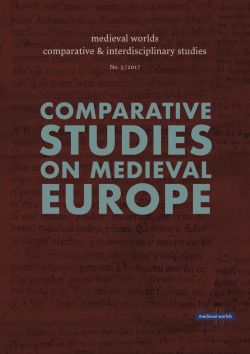 |
 |
Walter POHL – Andre GINGRICH (Eds.)
medieval worlds • no. 5 • 2017
medieval worlds 5 (2017)
Matthias Tischler,
Patrick Marschner
S. 195 - 220 doi: 10.1553/medievalworlds_no5_2017s195
Verlag der Österreichischen Akademie der Wissenschaften
Abstract:
In stark contrast to the Bible‘s paramount role of being the only book declared to have »World Heritage« status by the UNESCO, research on the »Book of Books« from a transcultural perspective is an almost neglected phenomenon: Neither the Bible’s relationship to other »holy or sacred« scriptures as modes of religious and cultural perceptions and transformations of the Others’ world, nor its decisive role as a »normative order« in the many modes of religious, social and cultural interaction in the Euro-mediterranean world have been comprehensively studied from a historical perspective. Because of their pretension of normativity, the religious laws of this world (Tanach, Talmud, Bible and Qur’ān) were competing against and confronting each other with alternative models of perceiving time, space and history. The diverse concepts of the three monotheisms had consequences for their common but nevertheless specific narratives, genres and books of exegetical, polemical and historiographical practice; yet, we do not have clear-cut ideas of the processes of possible entanglement between these modes of perceiving and transforming the Others’ history; nor do we know their exact place and value in the systems of knowledge or their retroactive effects (on either side) on the interpretations of their own religious laws. Our project intends to give answers to these basic questions based on the evidence of the Christian biblical and historiographical legacy in the transcultural frontier societies of the medieval Iberian Peninsula. We thereby change the perspective on the biblical legacy of these societies: Bible manuscripts are no longer seen as testimonies of texts or text traditions alone, but as bearers of canons: theoretical and practical concepts of history and perceptions of religious alterities. We therefore re-contextualize these perceptions of »the Others’ world« within, on the one hand, the larger context of the typological thinking of preserved biblical manuscripts, their materiality and mediality; and on the other hand, in their narrative framework of the related Iberian historiographical production.
Bible; historiography; canon; typology; identities; Iberian Peninsula; Christians, Jews and Muslims; transcultural studies Published Online:
2017/06/30 14:14:46 Object Identifier:
0xc1aa5576 0x00369e55
Rights:All rights reserved.For questions regarding copyright and copies please contact us by email.
MEDIEVAL WORLDS provides a new forum for interdisciplinary and transcultural studies of the Middle Ages. Specifically it encourages and links comparative research between different regions and fields and promotes methodological innovation in transdisciplinary studies. Focusing on the Middle Ages (c. 400-1500 CE, but can be extended whenever thematically fruitful or appropriate), MEDIEVAL WORLDS takes a global approach to studying history in a comparative setting.
MEDIEVAL WORLDS is open to regular submissions on comparative topics, but also offers the possibility to propose or advertise subjects that lend themselves to comparison. With a view to connecting people working on related topics in different academic environments, we publish calls for matching articles and for contributions on particular issues.
Table of Contents
Walter POHL, Editor’s Introduction
The Sudden Success of Prose –
a Comparative View of Greek, Latin, Old French and Old Norse
Lars Boje Mortensen
Could Isidore’s Chronicle Have Delighted Cicero? A Response
Richtard W. Burgess and Michael Kulikowski
Revisiting Pre-Modern Ethnicity and Nationhood: Preface
Ilya Afanasyev and Nicholas S. M. Matheou
»Becoming English«: Nationality, Terminology,
and Changing Sides in the Late Middle Ages
Andrea Ruddick
Reinventing Roman Ethnicity in High and Late Medieval Byzantium
Yannis Stouraitis
The Characteristics of Bodies and Ethnicity c. 900-1200
Claire Weeda
Rethinking Ethnicity and ›Otherness‹ in Early Anglo-Saxon England
James M. Harland
Church, Apostle and People in Early Ireland
Patrick Wadden
Digitising Patterns of Power (DPP):
Applying Digital Tools in the Analysis of Political and Social Transformations
in the Historical Region of Macedonia (12th–14th Centuries)
Mihailo St. Popović and Veronika Polloczek
The Bible in Historical Perception and Writing
of the Transcultural Iberian Societies, Eighth to Twelfth Centuries
Matthias Tischler und Patrick Marschner
The journal is funded by the Austrian Science Fund (FWF).

|





 Home
Home Print
Print
 References
References
 Share
Share
